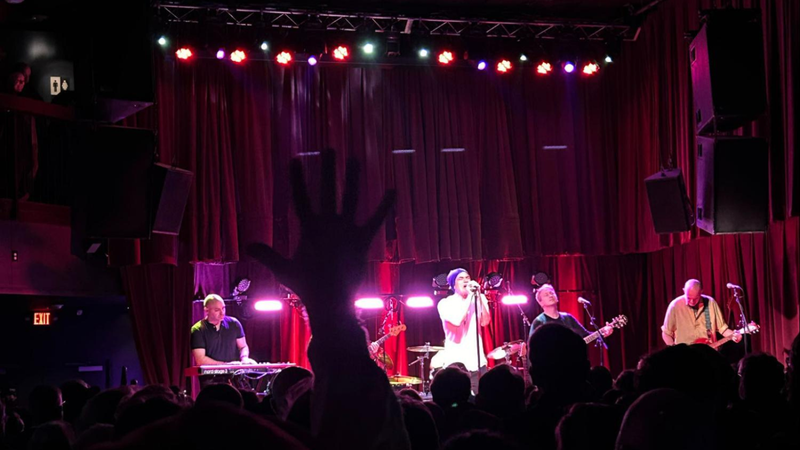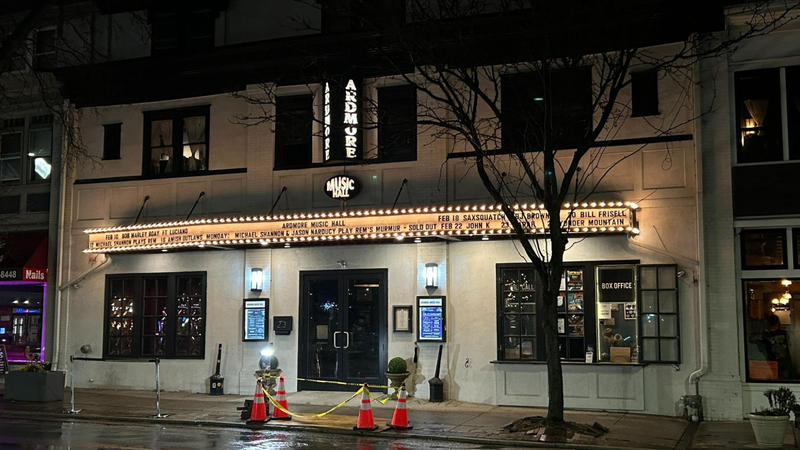
KYW Newsradio is taking a look at Philadelphia’s entertainment scenes this week with a series of special reports called “The State of Entertainment.” Today: how independent performance venues can continue to be economic drivers.
🎧 Listen to the Feb. 15, 2024, special broadcast "Streaming Wars: The End of Content's Golden Age?"
PHILADELPHIA (KYW Newsradio) — Michael Shannon was only three songs into his band’s cover set of the acclaimed R.E.M. album “Murmur,” but it was enough for him to know.
“We love this place already,” he told a sold-out crowd of 600 at the Ardmore Music Hall.
The average person might recognize Shannon, 49, more for his work on screen than on stage. The veteran, Emmy-nominated actor has held prominent roles in high-profile television series like HBO’s “Boardwalk Empire” and Hulu’s “Nine Perfect Strangers.” He also plays the recurring supervillain General Zod in the DC Comics cinematic universe.
But when Shannon has time, he also likes to hit the road to scratch his music itch, which is what brought him to Ardmore in the middle of February.
The stop was one of seven on a tour that dotted intimate, mostly independent mid-Atlantic music venues.
The reasons Ardmore made such a quick impression on Shannon were clear.
The room was packed — shoulder-to-shoulder, from the side stage bar all the way to the back of the floor and up to the balcony level. The audience was locked in.
Some people fixated on the captivating, 6-foot-3 Shannon as he twisted, turned, and contorted his body around his mic stand. Others simply closed their eyes and moved to the music, listening to Shannon channel his inner Michael Stipe.
“Certainly seeing everyone have those moments is one of the best parts of what we do,” said Chris Perella, Ardmore Music Hall’s owner and manager.
Perella and a group of partners purchased the Lancaster Avenue property that houses Ardmore Music Hall in 2019. The venue opened in 1980 as the 23 East Cabaret, then rebranded as Brownies 23 East in the mid-1990s.
The room has a rich history, hosting shows in the nascent days of future multi-million dollar touring acts like Red Hot Chili Peppers, Hootie & the Blowfish, Dave Matthews Band, and Phish.

Ardmore’s schedule remains busy to this day, and true to the mission of musical discovery. Operating as an independent venue, untethered from industry behemoths Live Nation and AEG (Anschutz Entertainment Group), is a point of pride.
“We've got people showing up three times a week, often seeing shows they've never heard of, and it's because of the way we're able to kind of curate and be tastemakers,” said Perella, who started booking shows at Ardmore Musical Hall in 2014. “That is how you build an audience for an artist instead of just forcing them to sell every single ticket on their own. I think [artists] see that, and that helps keep us competitive.”
Consistent with current national and global live music trends, Ardmore’s business is “pretty good” these days, Perella says.
But even in a record-setting year like 2023, when the top-100 worldwide tours grossed a staggering $9.17 billion, being an independent presents challenges.
“We’re certainly not raking in billions over here,” said Kerri Park, general manager at World Cafe Live in University City. “That [narrative] does us a real disservice, because people read things like that and think all venues are just out here making tons and tons of revenue, and it’s simply not the case.”
Originally, in 2004, World Cafe Live started out as an independent, for-profit venue. It switched to a nonprofit model in 2019 to better position itself to live its values and achieve its goals.
“The margins are so thin,” Park said. “We hand over most of the ticket money we generate directly to the artist or the staff that’s supporting the artists.
“When you look at a room like ours, we employ roughly 90 people, both part- and full-time. Our revenue goes right back into paychecks to those people, and also supporting programs that we have for people in the community.”
Companies like Live Nation and AEG, meanwhile, have the industry machine churning in their favor, holding a variety of venues in their portfolio, from tiny clubs to massive stadiums.
They can afford to take short-term financial risks by bidding high on unproven, emerging artists for their own small and medium-sized venues if they think the long-term payoff is Live Nation or AEG-controlled arenas and stadiums.
If artists go for the money, that cuts out independent venues of comparable capacities.
“[Live Nation] has such deep pockets that, whether or not they believe an artist is building toward an arena, they can lose money on 25 shows this month and not bat an eye. I can’t do that,” said Perella who, during the COVID-19 pandemic founded Rising Sun Presents, a venue operating, booking, and production company that, in addition to Ardmore Music Hall, services Underground Arts, Milkboy, Union Transfer, and other mom and pop venues in Philadelphia and the suburbs.
“Our businesses have to be viable and sustainable. If we lose money on a couple shows in a month, that's tough.”
Even more than the Live Nation and AEG juggernauts, the pandemic threatened the existence of independent venues.
Park is the Pennsylvania chapter president of the National Independent Venue Association, which formed as a 501(c)(6) trade organization right as the pandemic arrived.
The group ultimately succeeded in securing $16.5 billion in federal stimulus money for independent venues via the federal CARES Act. Philadelphia venues received a $138 million chunk of the pie.
“Financial support is something that’s critically important for what we do,” Park said.
There’s a lot at stake for major music markets, too. Lumped together, Philadelphia’s venues are a significant economic driver.
“The economic impact of concerts and festivals — that dollar doesn’t just stay within the venue,” said Raheem Manning, City of Philadelphia’s director of Night Time Economy and Business Development.
Manning says the money trickles down everywhere — from people flying into the airport, to using public transportation or Uber.
“Before a concert, they have to eat; they go out and have a good time. They’re most likely booking a hotel. So, when you look at the economic impact of live music, it’s bountiful.”
Manning’s position was created under former Philadelphia Mayor Jim Kenney in July 2022 as a direct response to the ripple effects of the pandemic.
In Manning’s first year in the gig, the West Philadelphia native and Overbrook High School graduate did a lot of listening, meeting regularly with stakeholders in a variety of industries that make up the city’s nighttime economy.
Now, armed with feedback and information, he wants numbers.
This year, the city is commissioning its first-ever data study aimed at digging into how different sectors in the nighttime economy (live music being one of them) move the needle.
With a better understanding of where the money is (or isn’t) coming from, Manning believes the city will be able to lean in more effectively.
“I think some of the things that we can look at working on are some of the things raised by NIVA,” said Manning, who expects the city’s nighttime economy data study to be completed by the end of 2024. “Making sure that we see them as an asset, cultural assets [that] are all protected and thought about in our plan so that live music continues to thrive.
“It doesn't have to just be big shows. It can be our small shows, our homegrown acts that start here and then grow. I think that's really important as we grow as a city.”
In addition to funding, Park and Perella share similar ideas about how Manning and city government can ease the burden on indie venues.
Addressing Philadelphia’s 5% amusement tax on all ticket sales is at the top of both their lists.
“For small venues, particularly, 1,000 capacity and less that amusement tax generates almost no money collectively for the city, but is a considerable lien item for [independent] venues,” Park said.
Logistics is another big issue.
Smaller venues are typically boxed into parts of the city’s infrastructure that are harder to access.
Think about Milkboy on 11th and Chestnut.
World Cafe Live’s main entrance is along a busy stretch of the Walnut Street Bridge that serves as the primary entryway to the heart of the University of Pennsylvania’s campus.
Perella thinks that more flexibility from the city could help relieve stress on all parties — venues, artists, and patrons alike.
“For both of our downtown clubs, Underground Arts and Milkboy, there's just no accommodation or willingness to accommodate things like buses for tours, or create a loading zone next to a venue that allows for an artist to unload their gear without being chased by the PPA,” said Perella. “Simple communication with someone in Philadelphia [government] to be able to communicate some of those needs on a one-off basis, depending on the venue and their location, would be huge.”
With arena and stadium-tier artists like Taylor Swift, Madonna, and Bruce Springsteen continuing their respective touring, and other big draws like Jennifer Lopez and the Rolling Stones setting out later this year, the live music forecast for 2024 is mostly bullish.
Time will tell if independent venues continue to ride industry tailwinds.
Either way, the indies will be ready.
“I think we've just fought harder,” Perella said, “and I think we've done so effectively. I'm proud of that.”
“When you see a roomful of people gathered for live entertainment, whether it's high school kids who are finding their voice and performing a song together for the first time that they wrote about their experience, or it is a group of people that come together every year to see their favorite artists who always chooses us on their annual tour, or a group of people experiencing a new artist for the first time, there's absolutely nothing like that feeling in this whole world,” said Park. “It's a feeling that I deeply believe in that I think is deeply important.”

